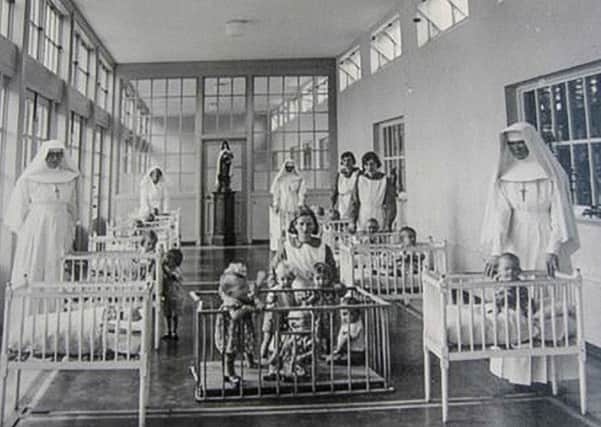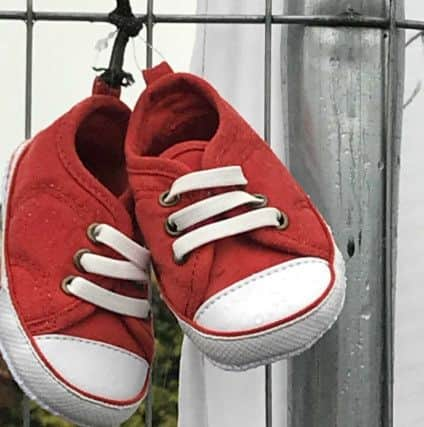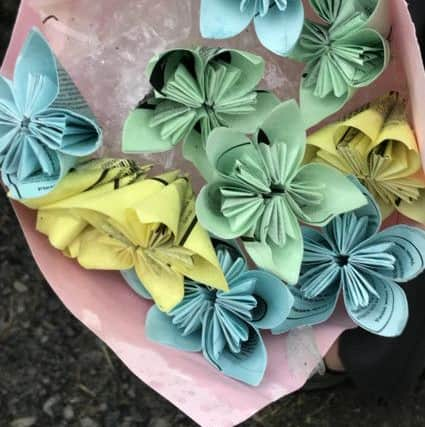Hidden history of Northern Ireland's mother and baby homes


The Tuam controversy is part of a larger episode in Irish history that focuses on the treatment of unmarried mothers and their children.
However the story is not only pertinent in the Republic of Ireland – Northern Ireland has its own hidden history in this respect. A stark advertisement that appeared in the Northern Whig in 1950 is evidence of this.
Advertisement
Hide AdAdvertisement
Hide AdSitting alongside notices about second hand cars is a notice that reads: ‘Bonny Baby Boy: full surrender given to kind Protestant parents - Box PM2112.’


In an era when stigma was attached to pre-marital pregnancy, how did Northern Ireland respond to this issue?
Professor Sean O’Connell from Queen’s University Belfast said: “We know very little about this and the babies involved are part of a hidden history.
“This advert suggests an ad hoc and furtive process took place, certainly at this point – 1950.”
Advertisement
Hide AdAdvertisement
Hide AdHe added: “We estimate that up to 4,700 Northern Irish women were sent to homes operated by Protestant churches, including Thorndale, Malone Place, Hopedene Hostel and Kennedy House between the 1920s and 1990s.


“A further 2,800, from the Catholic community, had their babies while residents of the Marianvale in Newry and Marianville in Belfast, which were operated by the Catholic Sisters of the Good Shepherd.
“In total, that is 7,500 women: each with their own story.
“Moreover, there are a further 7,500 potential stories to be told of what became of their babies.
“We are currently recording the memoires of some of those women and their children and would like to appeal to News Letter readers to help us secure even more.”
Advertisement
Hide AdAdvertisement
Hide Ad“We have been asked to discover the reality that lies behind the sketchy historical evidence on mother and baby homes in Northern Ireland that can be found in the dusty paperwork left behind.
“Our research will lead to a report for the Department of Health which will feed into a decision on whether or not Northern Ireland follows the Republic and instigates a full scale inquiry on mother and baby homes.”
Over the course of the past century, hundreds of women made the journey from their homes across Northern Ireland to a number of mother and baby homes run by Catholic and Protestant organisations, as well as by the state.
A smaller number of residential homes operated as so-called Magdalene laundries and a large number of women worked in them, for various lengths of time.
Advertisement
Hide AdAdvertisement
Hide AdWorking alongside Professor O’Connell on the examination of the mother and baby homes in Northern Ireland is Dr Leanne McCormick from Ulster University.
She said: “The mother and baby homes in Northern Ireland were, in general, for unmarried mothers who were not able to remain in their family home for the birth of their child.
“Women entered the homes in the months before their due date and stayed for varying lengths of time after they gave birth, depending on what was happening with their baby.
“Some women returned home with their baby or moved in with relatives and friends, but the majority of babies born in mother and baby homes were given up for adoption, or placed in foster care or orphanages.
Advertisement
Hide AdAdvertisement
Hide Ad“Society was a lot harsher and more judgemental in this period and being pregnant and unmarried often carried stigma and shame.
“Sadly, we know that many women were left unsupported by their families.
“Being left alone and afraid they may have felt unable to return home with their baby.
“Alternatively, they may feel that pressure was placed upon them to give up their baby for adoption.”
Advertisement
Hide AdAdvertisement
Hide AdShe said: “There were a wide variety of homes involved. Before the creation of the NHS, in 1948, the workhouse often operated as a type of mother and baby home for unmarried mothers.
“There were 27 workhouses in Northern Ireland and many operated ‘boarding out’ schemes, which were a form of fostering children, and mothers often were required to pay for the up-keep of children who were boarded out.
“The workhouses often organised adoptions as well.”
The research team also want to record interviews with anyone who worked in a mother and baby home or a Magdalene laundry in Northern Ireland, or who gained knowledge of these institutions because of their work.
This could include those working in the following categories at any point before the 1990s: Members of religious orders, clergy, social workers, doctors, nurses and others.
Advertisement
Hide AdAdvertisement
Hide AdDr McCormick continued: “Many women have never spoken about their time in these homes and may never have told their husbands or their children about the experience.
“With mother and baby homes in the news once again, we hope that some of these women will feel ready and willing to come forward now and share their stories with us.
“The process is completely confidential and anonymity is guaranteed. All interviewees are treated with the care and respect they deserve.”
She commented: “We are aware that they were made to feel shame at the time when they were giving birth to their babies, now they have the opportunity to help us write the non-judgemental historical account.
Advertisement
Hide AdAdvertisement
Hide Ad“Our research can be assisted greatly by anyone who had any contact with any of these institutions other than as a resident.
“To fully understand the operation of the homes we would appeal to any doctors, nurses, or midwives who encountered women from the homes during their work or a member of the clergy who referred women to the homes.”
The examination of mother and baby homes in Northern Ireland has been commissioned by the Department of Health after the Executive admitted there was limited knowledge about their operation in Northern Ireland.
Professor Sean O’Connell from the School of History, Anthropology, Philosophy and Politics at Queen’s University and Dr Leanne McCormick from the School of Arts and Humanities at Ulster University are leading the research team on the 12-month project.
Advertisement
Hide AdAdvertisement
Hide AdResearchers will examine archive records held by the state, churches and relevant voluntary organisations with the primary task of preparing a detailed report on the day-to-day operation and practices within Northern Ireland’s mother and baby homes and Magdalene laundries.
The report’s finding will inform future deliberations about a possible public inquiry on the subject.
The Salvation Army carried out maternity work at Thorndale in Belfast until 1995 and Malone Place, operated by the Belfast Midnight Mission, ran from 1900 until it was closed in 1981, providing for both married and unmarried mothers.
The Church of Ireland Rescue League worked with unmarried mothers at Kennedy House until it closed in 1956. Another Church of Ireland home – Hopedene Hostel on Dundela Avenue – ran from 1943 to 1985.
Advertisement
Hide AdAdvertisement
Hide AdFor Catholic women, the options included Marianville in Belfast and Marianvale in Newry in 1955. The Legion of Mary also ran a home – Mater Dei – on the Antrim Road from 1940 to 2000.
The interviews in relations to Northern Ireland’s mother and baby homes will be carried out by experienced oral historians, Olivia Dee and Professor Sean O’Connell.
They can be contacted by phone on 02890 973153, email [email protected] or by post to Professor Sean O’Connell, Queen’s University Belfast, 25 University Square, Belfast BT7 1NN.
The homes which they are interested in are:
• Good Shepherd Sisters (Marianville and Marianvale) at 511 Ormeau Road, Belfast and 132, Armagh Road, Newry
• Mater Dei Hostel - 298 Antrim Road, Belfast
Advertisement
Hide AdAdvertisement
Hide Ad• Belfast Midnight Mission/Malone Place Rescue and Maternity Home - Malone Road, Belfast
• Thorndale House (Salvation Army) - Duncairn Avenue, Belfast
• Kennedy House - 8 Cliftonville Avenue, Belfast,
• Hopedene Hostel - 55 Dundela Avenue
• Belfast Welfare Hostel - Lisburn Road, Belfast
• Coleraine Welfare Hostel
• Mount Oriel Hostel - 4 Mount Oriel, Belfast
• Deanery Flatlets - Belfast
• Pre-1948 Workhouses